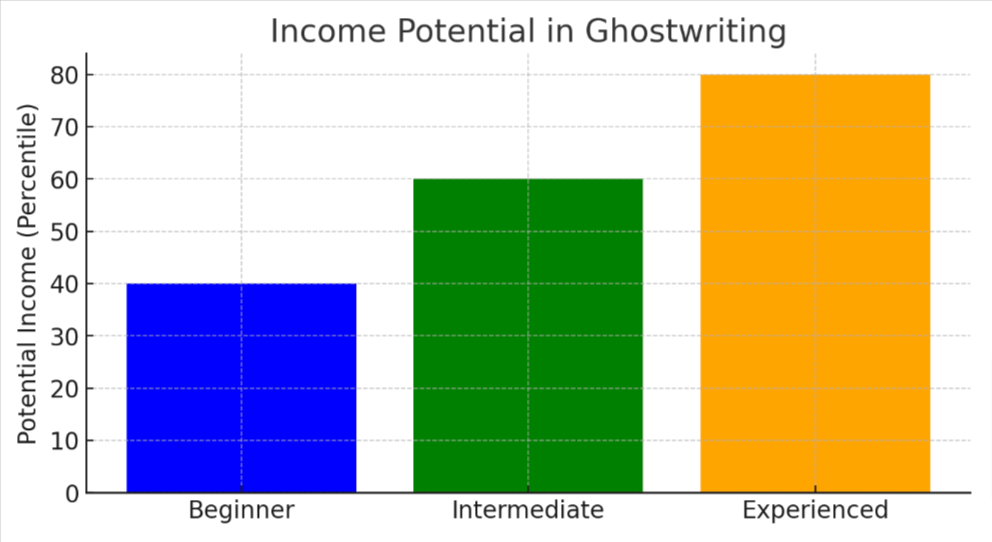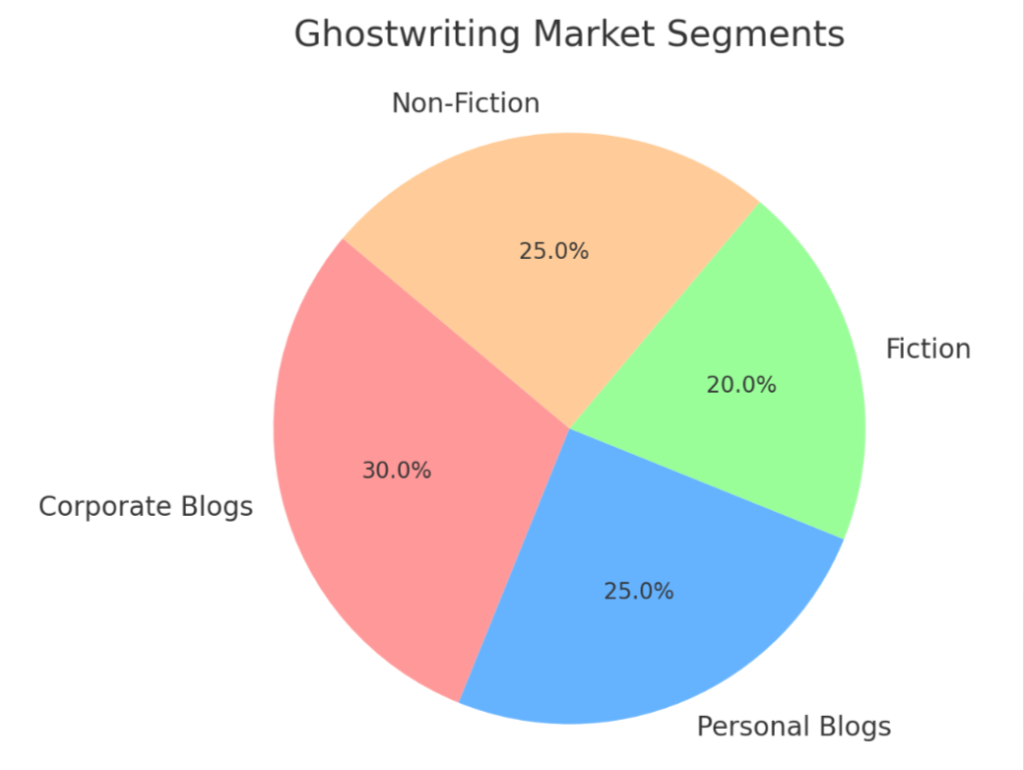The Secrets to Successful Ghostwriting in Blogs and Authorship
Have you ever marveled at the sheer volume of content that successful bloggers and authors churn out? One surprising fact is that many of them don’t go it alone – they use ghostwriters.
In this post, we’ll unpack how ghostwriting helps create compelling blog and book material, all while keeping your voice authentic and lively. Keep reading to unlock the secret world of ghostwriting!
Key Takeaways
- Ghostwriters create content for others to publish under their own names, offering professional writing services without personal credit.
- This profession can yield substantial incomes and the chance to connect with important figures in blogging and authorship.
- Ethical standards are critical in ghostwriting; they include safeguarding clients’ intellectual property and maintaining confidentiality.
- Ghostwriters must have excellent writing abilities, SEO knowledge, a robust portfolio, and the capacity to find paid work while remaining professional.
- The trade-off of ghostwriting is anonymity which might affect personal brand recognition but provides opportunities for behind-the-scenes influence.
What is Ghostwriting?
Diving into the essence of ghostwriting, it’s a service where writers craft content for clients who then publish the work under their own names. Ghostwriters are the invisible force behind various forms of written material such as blog posts, books, articles, and even speeches.
They provide professional writing services without taking credit for the finished product.
Clients turn to ghostwriter services when they lack the time or skills to write themselves. A ghostwriter steps in to deliver high-quality content creation that resonates with audiences while maintaining complete confidentiality.
Whether you’re hiring a ghostwriter for blogs or seeking assistance in book writing, these literary professionals focus on giving voice to someone else’s ideas and stories.
Benefits of Ghostwriting for Bloggers and Authors
Ghostwriting for bloggers and authors can lead to high paying opportunities and the chance to build relationships with influential figures in their industry.
High paying opportunities
High paying opportunities abound in the realm of ghostwriting for blogs and authors. Skilled writers can earn a substantial income by providing professional writing services to clients who need quality content creation but lack the time or ability to write it themselves.
These jobs offer competitive rates, often surpassing traditional freelance writing gigs. As ghostwriters craft blog posts, books, or articles under someone else’s name, they can charge premium prices for their anonymity and specialized skills.
Securing a role as a ghostwriter for high-profile clients often leads to even more lucrative contracts. Authors seeking anonymous blog writing or assistance with book projects are willing to invest generously in hiring a ghostwriter whose work reflects their voice and meets publishing standards.
With each successful project, ghostwriters enhance their reputation within the industry, which frequently results in repeat business and referrals to other well-paying opportunities.

Building relationships with influential figures
Working as a ghostwriter opens doors to connect with influential figures in the blogging and authorship world. These relationships can be invaluable for your career. By providing professional writing services, you get a unique chance to engage with thought leaders and experts who might otherwise seem out of reach.
Conversing with them about content creation for blogs or books helps you understand industry trends and boosts your reputation among other professionals.
Through these interactions, networking opportunities grow, potentially leading to more ghostwriting jobs. By consistently delivering high-quality work under their name, you earn trust and may become the go-to person when they need anonymous blog writing or discreet editorial services.
This circle of influence can endorse your skills indirectly by referring new clients who are looking for reliable freelance ghostwriting solutions.
Potential Concerns of Ghostwriting
While ghostwriting can provide lucrative opportunities, some ethical concerns may arise regarding the lack of personal recognition for your work and potential conflicts with building your own platform.
It’s important to consider these factors before pursuing a career in ghostwriting.
Ethical considerations
When ghostwriting, it’s essential to maintain ethical standards by respecting the original author’s intellectual property rights and confidentiality. Ghostwriters should adhere to professional integrity by abstaining from disclosing any confidential information about the work they have completed for their clients.
It is also crucial for ghostwriters to stay transparent with their clients about their role in the content creation process and ensure that all parties involved are clear on the terms of ownership and usage of the written material.
Maintaining credibility in ghostwriting involves upholding honesty and integrity throughout the writing process. Ghostwriters must refrain from engaging in any form of plagiarism or misrepresentation, ensuring that all content produced is original and attributed appropriately.
Impact on personal recognition and platform building
Navigating the realm of ghostwriting can impact personal recognition and platform building for writers. Operating behind the scenes, ghostwriters may miss out on public credit and notoriety, hindering their ability to establish a reputable brand and following.
On the contrary, successful projects can enhance credibility and open doors to new opportunities within specific niches or industries – showcasing expertise without direct attribution.
Comprehending the implications of ghostwriting provides insight into personalized marketing strategies as well as intentional development of an influential identity in professional circles, fostering relationships with clients, readership, and industry gatekeepers.
How to Become a Ghostwriter
Develop your writing skills, understand SEO, build a strong portfolio, find paying opportunities, and always maintain professionalism and confidentiality in the ghostwriting industry.
Developing writing skills
To develop writing skills, practice regularly and seek feedback to improve. Understand SEO principles and how to incorporate keywords organically into content. Start by building a portfolio with diverse samples of your writing style.
Look for paying opportunities on freelance platforms or reach out directly to potential clients. Maintain professionalism by meeting deadlines and honoring confidentiality agreements.
Understanding SEO is crucial when developing writing skills for ghostwriting. Incorporating keywords seamlessly will enhance the visibility of the content you create while appealing to search engines.
Understanding SEO
Understanding SEO is crucial for ghostwriters looking to enhance the visibility and reach of their written content. By incorporating relevant keywords and optimizing meta descriptions, ghostwriters can ensure that the blogs and articles they create rank higher in search engine results.
This not only boosts the credibility and authority of the author or blog but also increases traffic and reader engagement, ultimately leading to more exposure for their work.
Additionally, understanding SEO involves creating high-quality, valuable content that aligns with search intent. By focusing on user experience through clear formatting, headings, and engaging writing styles, ghostwriters can optimize content for both search engines and human readers.
Building a portfolio
To build a portfolio as a ghostwriter, start by showcasing your writing skills and versatility. Write different types of content, such as blog posts, articles, and e-books to display your expertise in various genres.
Utilize SEO techniques to demonstrate your understanding of optimizing content for online visibility. Seek paying opportunities that align with your niche and interests, gradually expanding the range of topics you cover.
Maintain professionalism and uphold confidentiality when working with clients to establish trustworthiness and reliability in the industry.
Finding paying opportunities
To secure paying opportunities, aspiring ghostwriters can proactively seek out potential clients by networking on professional platforms and freelance job boards. They should also consider approaching blog owners or authors directly to offer their services.
By showcasing a strong portfolio that highlights their expertise in relevant niches and understanding of SEO best practices, ghostwriters can attract potential clients seeking high-quality content for their blogs or books.
Additionally, refining negotiation skills and setting clear rates based on the scope of work will help ghostwriters establish mutually beneficial working relationships with clients who value their contributions.
Maintaining professionalism and confidentiality
Ghostwriting requires a high level of professionalism to keep clients’ trust. It’s essential to handle all communications and transactions with discretion while respecting the client’s privacy.
Adhering to strict confidentiality agreements is crucial, ensuring that sensitive information remains secure. Managing multiple projects simultaneously demands strong organization skills and an unwavering commitment to maintaining professional standards throughout.
A ghostwriter should always prioritize delivering top-quality work without compromising the confidentiality of their clients.

Conclusion
In conclusion, ghostwriting offers high-paying opportunities for bloggers and authors. Ghostwriters can build relationships with influential figures in the industry. It’s crucial to consider ethical implications and the impact on personal recognition when pursuing ghostwriting opportunities.
Aspiring ghostwriters should focus on developing their writing skills, understanding SEO, building a strong portfolio, finding paying gigs, and maintaining professionalism and confidentiality.

